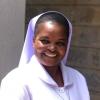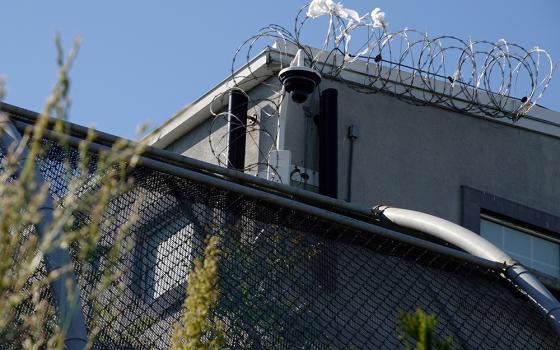A Latin-English edition of the Catholic Church's Code of Canon Law is pictured on a bookshelf. (CNS/Nancy Phelan Wiechec)
Becoming a canon lawyer wasn't always part of the plan — or at least, it didn't seem like a realistic one for a religious woman advancing in age. As a Sister of the Holy Spirit from Zambia, I had always wanted to pursue studies in one of the church's disciplines, especially pastoral theology or canon law. But over time, this dream was shattered as I began to believe that no organization would want to sponsor anybody beyond age 40. I had told myself that my desire for studies would end in imagination and dreams.
But the God of miracles surprised me one morning when my superior broke the news: I had received the opportunity to study canon law, thanks to a sponsorship from the International Union of Superiors General, or UISG. At that stage I did not know how to express my feelings. When the time came, I eagerly left for school, full of gratitude.
In 2020, I began my canon law studies at the Catholic University of Eastern Africa in Nairobi, Kenya, with one year of philosophy as a requirement for enrollment. Thankfully, I already had a theology background, so I was exempt from that requirement. One of my most exciting moments was the day I was oriented to begin my three years of the licentiate program. My joy was indescribable. I will never forget the excitement!
The three years passed quickly. I completed my studies this past year, but the joy of being a canon lawyer — felt even before setting out to pursue studies — remains. My joy is also strong because my journey is unique: I am the first person in my congregation and the first religious woman in the Catholic Diocese of Monze, Zambia, to study canon law.
But more important than feeling special is what canon law has offered me: a profound integration of faith and legal principles. It has deepened my personal spirituality while equipping me to serve the church and its members in a more meaningful way.
The knowledge of canon law will help me to make meaningful contributions, whether advising on ecclesiastical matters or simply in my interaction with people. Canon law has helped me develop analytical thinking, and I no longer think in the same old way. It has given me new attitudes and perceptions — especially about how I react to people and how I interpret experiences.
While canon law is deeply fulfilling, the journey was not without challenges.
I faced many reactions from people when I told them what I would be studying and still do, even after graduation. Most people were surprised that I wanted to study canon law, but some questioned why I wanted to study it and how canon law would benefit me. Others wondered what a sister, as a canon lawyer, could do.
All these reactions made me realize that many religious women here in Zambia are unfamiliar with the work of canon lawyers. As a result, they are not excited about it. This makes it very difficult to engage people. Even those who know what canon law is, are still apprehensive. It's not surprising to hear someone say: "You are the people who are going to raise cases against us."
While my congregation gave me an opportunity to study canon law, they seem to not be sure of what a female canon lawyer can do for her own institute. When I asked my superior what I would do after my studies, she told me we had to wait for some diocese to offer us a position. From this response, it is very clear that it is not yet fully understood what I can offer with my new skills, even in the congregation.
Advertisement
Clericalism is another challenge that cannot be ignored in our church. Even today, the church's canon code includes restrictions about who can fulfill roles such as judicial vicars or judges — even if these people have attained the same qualifications as clerics.
These exclusions are also supported by cultural expectations and institutional practices, which can add pressure and create barriers. Women face limited employment and professional advancement, even when a few are available to them.
In class, I also encountered male dominance, not just because I was in the minority, but because I was a woman. We were only three women among 15 students, so it was very easy to feel outnumbered by men. I was determined to not let men dominate class discussions or silence the women.
I often noticed that each time we came across certain statements in the Code of Canon Law — such as those barring laypeople from certain roles — it gave a lot of joy to the clerics. It was distressing to witness.
Recently, one cleric insisted that even if someone consulted a woman religious who was a canon lawyer, they would still seek confirmation with a priest because they wouldn't be satisfied with a woman's view. He also argued that things will remain this way in the church no matter what women do. Such sentiments are very discouraging for women. They drain their motivation because despite their qualifications, male dominance is deeply entrenched in the church and looking down on women is still very strong. Unfortunately, some women are also part of this mentality because they, too, withhold their support from women who are equally qualified.
The Second Vatican Council opened many doors for women to be a part of the church's mission. Pope Francis made many visible strides to promote the inclusion of women in the life and mission of the church. His efforts however, are still challenged by the actual practice. Change is still desired, especially when it comes to changing people's minds.





